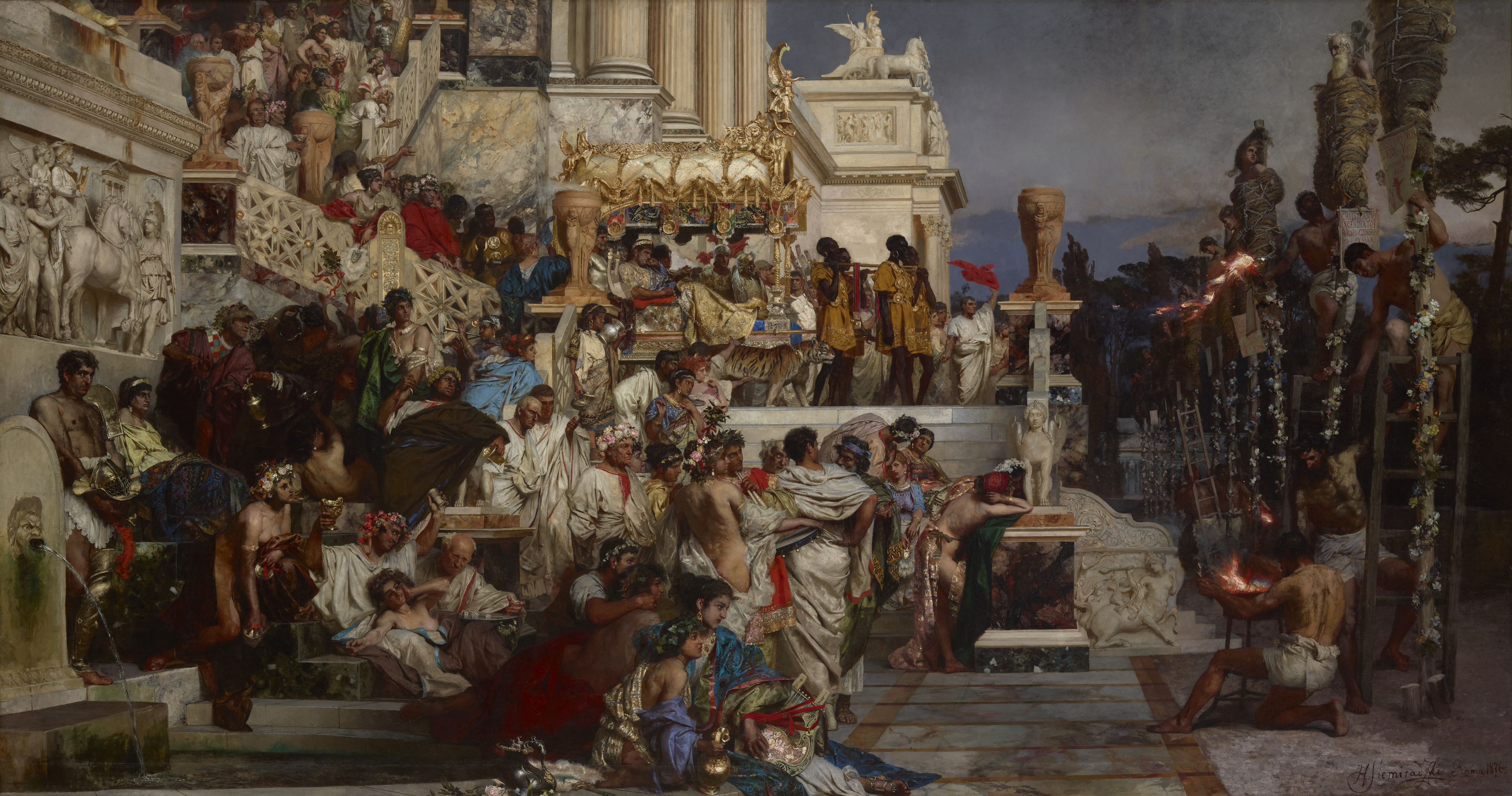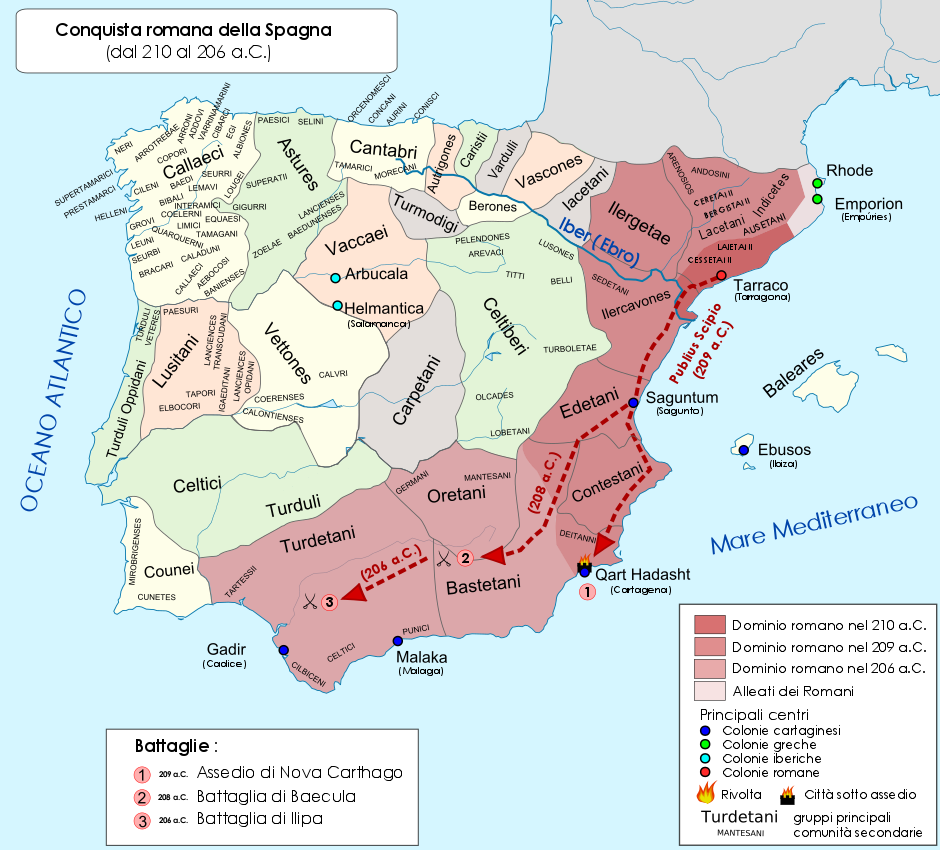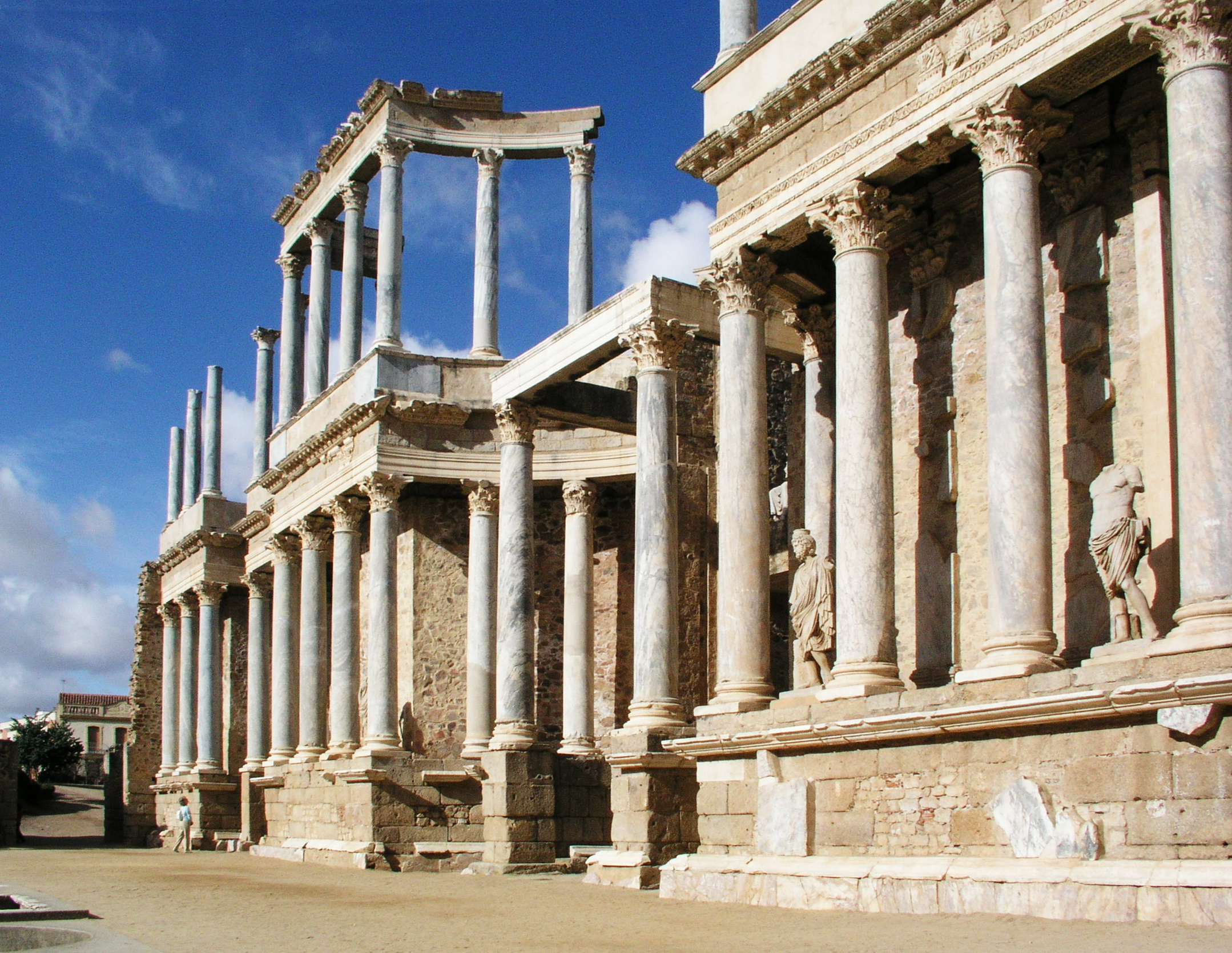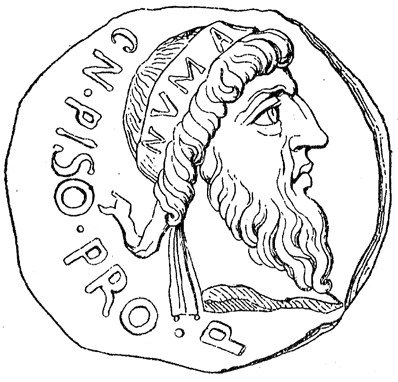|
Pomponia
Pomponia is the female name for the Pomponia gens of Ancient Rome. This family was one of the oldest families in Rome. Various women bearing this name lived during the Middle and Late Roman Republic and the Roman Empire. The oldest known Pomponia was mother of a famous Roman general; the second and third were related to each other. The relationship between these women, if any, is not known. They descended from Pomponius, the first son of Numa Pompilius, the second King of Rome. Pomponia, mother of Scipio Africanus Pomponia (fl. 212 BC) was a Roman woman who lived in the 3rd century BC. She came from a Roman noble family who were of plebeian status, and were prominent knights or equestrians. She was the daughter of the consul Manius Pomponius Matho, consul in 233 BC (who appears to have died in 211 BC), and was married possibly around 237 BC to Publius Cornelius Scipio, second surviving son of the Roman censor Lucius Cornelius Scipio of a prominent patrician family. Her husband ... [...More Info...] [...Related Items...] OR: [Wikipedia] [Google] [Baidu] |
Pomponia Gens
The gens Pomponia was a plebeian family at ancient Rome. Its members appear throughout the history of the Roman Republic, and into imperial times. The first of the gens to achieve prominence was Marcus Pomponius, tribune of the plebs in 449 BC; the first who obtained the consulship was Manius Pomponius Matho in 233 BC.''Dictionary of Greek and Roman Biography and Mythology'', vol. III, p. 493 (" Pomponia Gens"). Origin In the latter part of the Republic, it was common for various gentes to claim descent from the founding figures of Rome; the companions of Aeneas, Romulus, or those who came to Rome in the time of the kings. The Pomponii claimed to be descended from Pompo, one of the sons of Numa Pompilius, the second King of Rome, whose image appears on some of their coins. Several other gentes also claimed Numa as their ancestor. ''Pompo'', asserted as the name of the ancestor of the Pompilii, does indeed appear to have been an ancient praenomen of Sabine origin. It was t ... [...More Info...] [...Related Items...] OR: [Wikipedia] [Google] [Baidu] |
Caecilia Attica
Attica (born ca 58–51 BC, perhaps died around 32–29 BC) was the daughter of Cicero's Epicurean friend Titus Pomponius Atticus. She was also the first wife of Marcus Vipsanius Agrippa, close friend of the emperor Augustus. Early life Attica is generally held to have been born in 51 BC but some historians have argued for earlier dates, E. F. Leon proposed 55 BC, which was accepted by Meyer Reinhold and Stephen V. F. Waite while D. R. Shackleton Bailey dated Cicero's letter where he mentions her recent birth to 58 BC. Her mother, Pilia (born before 75 BC), daughter of Pilius, was a maternal granddaughter of Marcus Licinius Crassus, a member of the First Triumvirate. Her father Titus Pomponius Atticus, Atticus and Pilia were married circa 58–56 BC, when Atticus was already 53 or 54 years old. Her mother died after 12 years of marriage in 46 BC. Name Attica's father Titus Pomponius Atticus was at a relatively advanced age adopted by his maternal uncle, Quintus Caecilius (adoptive ... [...More Info...] [...Related Items...] OR: [Wikipedia] [Google] [Baidu] |
Titus Pomponius Atticus
Titus Pomponius Atticus (November 110 BC – 31 March 32 BC; later named Quintus Caecilius Pomponianus Atticus) was a Roman editor, banker, and patron of letters, best known for his correspondence and close friendship with prominent Roman statesman Marcus Tullius Cicero. Atticus was from a wealthy Roman family of the equestrian class (lower aristocratic non-ruling class) and from the Pomponia gens. A close friend since childhood, Cicero dedicated his treatise, , to Atticus. Their correspondence, often written in subtle code to disguise their political observations, is preserved in (''Letters to Atticus'') compiled by Tiro, Cicero's slave (later his freedman) and personal secretary. Biography Early life Born Titus Pomponius in Rome , Atticus' parents were Titus Pomponius, a wealthy businessman, and Caecilia. His family were equestrians and likely had been members of the prestigious equestrians with public horse () for many generations. He had a sister named Pomponia ... [...More Info...] [...Related Items...] OR: [Wikipedia] [Google] [Baidu] |
Quo Vadis (novel)
''Quo Vadis: A Narrative of the Time of Nero'' () is a historical novel written by Henryk Sienkiewicz in Polish. The novel ''Quo Vadis'' tells of a love that develops between a young Christian woman, Lygia (Ligia in Polish), and Marcus Vinicius, a Roman patrician. It takes place in the city of Rome under the rule of emperor Nero, from to AD 68 when Nero committed suicide. Sienkiewicz studied the Roman Empire extensively before writing the novel, with the aim of getting historical details correct. Consequently, several historical figures appear in the book. As a whole, the novel carries a pro-Christian message. It was first published in instalments in the ''Gazeta Polska'' between 26 March 1895 and 29 February 1896, as well as in two other journals, ''Czas'' and ''Dziennik Poznański'', starting two and three days later. It was published in book form in 1896 and has been translated into more than 50 languages. The novel contributed to Sienkiewicz's Nobel Prize in Literature ... [...More Info...] [...Related Items...] OR: [Wikipedia] [Google] [Baidu] |
Aulus Plautius
Aulus Plautius was a Roman politician and general of the mid-1st century. He began the Roman conquest of Britain in 43, and became the first governor of the new province, serving from 43 to 46. Career Little is known of Aulus Plautius's early career. It was previously believed that he was involved in the suppression of a slave revolt in Apulia, which possibly happened in 24, alongside Marcus Aelius Celer. However, the "A·PLAVTIO" of the inscription is now identified as Aulus' father of the same name, Aulus Plautius. The younger Plautius was suffect consul for the second half of 29, with Lucius Nonius Asprenas as his colleague. Subsequently, he held a provincial governorship, probably of Pannonia, in the early years of Claudius's reign; another inscription shows he oversaw the building of a road between Trieste and Rijeka at that time. Anthony Birley suspects Plautius also played a role in suppressing the coup by Lucius Arruntius Camillus Scribonianus in 42.Birley, ''Fasti ... [...More Info...] [...Related Items...] OR: [Wikipedia] [Google] [Baidu] |
Publius Cornelius Scipio (consul 218 BC)
Publius Cornelius Scipio (died 211 BC) was a general and statesman of the Roman Republic and the father of Scipio Africanus. A member of the Cornelia ''gens'', Scipio served as consul in 218 BC, the first year of the Second Punic War. At the outbreak of the war, he was ordered to conduct the war effort in the Iberian Peninsula and confront Hannibal himself, while his fellow consul Tiberius Sempronius Longus was allocated Sicily and Africa. Scipio was given permission to recruit two Roman legions, 14,000 allied infantry, 1,600 allied cavalry and given 60 quinqueremes. He sailed with his army from Pisa with the intention of confronting Hannibal in Hispania. Stopping at Massalia (today Marseille) to replenish his supplies, he was shocked to discover that Hannibal's army had moved from Hispania and was crossing the Rhône. Scipio disembarked his army and marched to confront Hannibal, who, by now, had moved on. Returning to the fleet, he entrusted the command of his army to his br ... [...More Info...] [...Related Items...] OR: [Wikipedia] [Google] [Baidu] |
Scipio Africanus
Publius Cornelius Scipio Africanus (, , ; 236/235–) was a Roman general and statesman who was one of the main architects of Rome's victory against Ancient Carthage, Carthage in the Second Punic War. Often regarded as one of the greatest military commanders and strategists of all time, his greatest military achievement was the defeat of Hannibal at the Battle of Zama in 202 BC. This victory in Africa earned him the honorific epithet ''Africanus'', literally meaning 'the African', but meant to be understood as a conqueror of Africa (Roman province), Africa. Scipio's conquest of Carthaginian Iberia culminated in the Battle of Ilipa in 206 BC against Hannibal's brother Mago Barca. Although considered a hero by the Roman people, primarily for his victories against Carthage, Scipio had many opponents, especially Cato the Elder, who hated him deeply. In 187 BC, he was tried in a show trial alongside his brother for bribes they supposedly received from the Seleucid king Antiochus III ... [...More Info...] [...Related Items...] OR: [Wikipedia] [Google] [Baidu] |
Marcus Vipsanius Agrippa
Marcus Vipsanius Agrippa (; BC – 12 BC) was a Roman general, statesman and architect who was a close friend, son-in-law and lieutenant to the Roman emperor Augustus. Agrippa is well known for his important military victories, notably the Battle of Actium in 31 BC against the forces of Mark Antony and Cleopatra. He was also responsible for the construction of some of the most notable buildings of his era, including the original Pantheon. Born to a plebeian family , in an uncertain location in Roman Italy, he met the future emperor Augustus, then known as Octavian, at Apollonia, in Illyria. Following the assassination of Octavian's great-uncle Julius Caesar in 44 BC, Octavian returned to Italy. Around this time, Agrippa was elected tribune of the plebs. He served as a military commander, fighting alongside Octavian and Caesar's former general and right-hand man Mark Antony in the Battle of Philippi. In 40 BC, he was ''praetor urbanus'' and played a major role in the Peru ... [...More Info...] [...Related Items...] OR: [Wikipedia] [Google] [Baidu] |
Vipsania Agrippina
Vipsania Agrippina (; unknown – 20 AD) was the first wife of the Roman emperor, Emperor Tiberius. She was the daughter of Marcus Vipsanius Agrippa and Attica (wife of Agrippa), Attica, thus being a granddaughter of Titus Pomponius Atticus, the best friend of Cicero. Biography She was betrothed by Augustus and her father to Tiberius, the stepson of Augustus, before her first birthday. They were married around 19 BC. Their son, Drusus Julius Caesar, was born in 14 BC. Despite Vipsania and Tiberius enjoying a happy marriage, Augustus ordered the two to divorce after the death of Vipsania's father, who was married to Augustus's daughter Julia the Elder.Suetonius, ''Tiberius'' 7 Even though Tiberius wished to remain with Vipsania and held disdain for Julia for her purported unfaithfulness, Augustus engaged him to Julia in order to link Tiberius's growing power to the Julian family. At the time of their divorce, Vipsania was pregnant with a second child, who did not survive. Tibe ... [...More Info...] [...Related Items...] OR: [Wikipedia] [Google] [Baidu] |
Numa Pompilius
Numa Pompilius (; 753–672 BC; reigned 715–672 BC) was the Roman mythology, legendary second king of Rome, succeeding Romulus after a one-year interregnum. He was of Sabine origin, and many of Rome's most important religious and political institutions are attributed to him, such as the Roman calendar, Vestal Virgins, the cult of Mars, the cult of Jupiter, the cult of Romulus, and the office of ''pontifex maximus''. Genealogy According to Plutarch, Numa was the youngest of Pomponius's four sons, born on the day of Rome's founding (traditionally, 21 April 753 BC). He lived a severe life of discipline and banished all luxury from his home. Titus Tatius, king of the Sabines and a colleague of Romulus, gave in marriage his only daughter, Tatia (wife of Numa Pompilius), Tatia, to Numa. After 13 years of marriage, Tatia died, precipitating Numa's retirement to the countryside. According to Livy, Numa resided at Cures, Sabinum, Cures immediately before being elected king.Livy, ''Ab u ... [...More Info...] [...Related Items...] OR: [Wikipedia] [Google] [Baidu] |
Manius Pomponius Matho
Manius Pomponius Matho ( 236 – 211 BC) was a Roman general who was elected consul for the year 233 BC with Quintus Fabius Maximus Verrucosus. He was also the maternal grandfather of the general and statesman Scipio Africanus. Career During his consulship, Matho carried on the war against the Sardinians and was granted a triumph for his victory over them. However, this victory was incomplete, because the war was continued by his brother Marcus, consul in 231 BC. In 217 BC, he was apparently chosen magister equitum (Eng. "master of the horse") to the dictator, Lucius Veturius Philo, and was elected praetor for the following year, 216 BC. There seems no reason for believing that the Matho, praetor of this year, was a different person from the consul of 233 BC, as the Romans were now at war with Hannibal, and were therefore anxious to appoint to the great offices of the state generals who had had experience in war. The lot, however, did not give any military command to Matho, but th ... [...More Info...] [...Related Items...] OR: [Wikipedia] [Google] [Baidu] |
Julia Livia
Julia Livia (AD 7–43) was the daughter of Drusus Julius Caesar and Livilla, and granddaughter of the Roman Emperor Tiberius. She was also a first cousin of the emperor Caligula, and niece of the emperor Claudius. Biography Early life Julia was born in the later years of the reign of her adoptive great-grandfather, Emperor Augustus, and was the daughter of Drusus Julius Caesar (a grandson of Augustus wife' Livia Drusilla through her son Tiberius) and Livilla (a granddaughter of Livia Drusilla through her son Nero Claudius Drusus, and a granddaughter of Mark Antony through his daughter Antonia Minor). At the time of Augustus' death in AD 14, Julia, who was in early childhood, fell ill. Before he died, the aged emperor had asked his wife Livia whether Julia had recovered. Marriages Upon the death of Augustus, Julia's paternal grandfather, Tiberius, succeeded him as Rome's second Emperor. It was during her grandfather's rule, when she was around the age of 16, that Julia marr ... [...More Info...] [...Related Items...] OR: [Wikipedia] [Google] [Baidu] |




